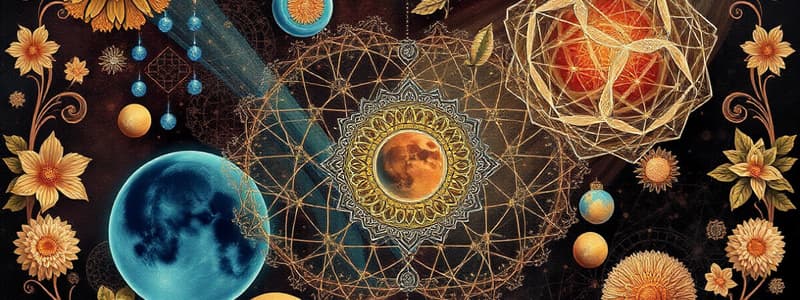Podcast
Questions and Answers
What defines the shape of liquids in contrast to solids?
What defines the shape of liquids in contrast to solids?
- Liquids can be measured only by weight.
- Liquids possess a rigid structure.
- Liquids have a definite shape like solids.
- Liquids take on the shape of their container. (correct)
Which of these is an example of plasma?
Which of these is an example of plasma?
- Water vapor
- Lightning (correct)
- Liquid nitrogen
- Sunlight
How does the density of gases compare to that of solids and liquids?
How does the density of gases compare to that of solids and liquids?
- Gases have the same density as liquids.
- Gases have a higher density than solids.
- Gases have the lowest density of all states of matter. (correct)
- Gases have a lower density than liquids.
What phase transition refers to a liquid changing into a gas?
What phase transition refers to a liquid changing into a gas?
Which state of matter is described as having both properties of a liquid and a gas?
Which state of matter is described as having both properties of a liquid and a gas?
What happens during the sublimation process?
What happens during the sublimation process?
Which statement is true regarding plasma?
Which statement is true regarding plasma?
Which of the following is NOT one of the four states of matter?
Which of the following is NOT one of the four states of matter?
What is a characteristic of matter in a solid state?
What is a characteristic of matter in a solid state?
Which of the following examples represents a liquid state of matter?
Which of the following examples represents a liquid state of matter?
Plasma is considered to be what in terms of its abundance in the universe compared to other states of matter?
Plasma is considered to be what in terms of its abundance in the universe compared to other states of matter?
In which state of matter do atoms exhibit the most movement?
In which state of matter do atoms exhibit the most movement?
What is a defining feature of gases?
What is a defining feature of gases?
Which of the following statements about solids is true?
Which of the following statements about solids is true?
Which of these examples is considered plasma?
Which of these examples is considered plasma?
Flashcards are hidden until you start studying
Study Notes
States of Matter
- Matter is the material that makes up everything in the universe.
- The four states of matter are solid, liquid, gas, and plasma.
- On Earth, matter is mostly found in solid, liquid, or gas form, while plasma is much rarer.
Solid
- Solids have the least amount of energy and are tightly packed together.
- Solids have a definite shape and volume.
- Examples of solids include ice, bricks, and gold.
Liquid
- Liquids have moderate energy and are loosely packed together.
- Liquids have a definite volume but an indefinite shape.
- Liquids take on the shape of their container
- Examples of liquids include water and milk.
Gas
- Gases have a high amount of energy and are not packed together.
- Gases have an indefinite shape and volume and take on the shape of their container.
- Examples of gases include water vapor and helium.
Plasma
- Plasma is the most common state of matter in the universe, but rare on Earth.
- Plasma is a gas-like state of matter with a high level of energy due to free-floating electrons and positively charged ions.
- Forms include solar winds, interstellar nebulae, lightning, neon signs, fluorescent tube lights, and plasma televisions.
Phase Transitions
- Condensing: Gas to liquid
- Freezing: Liquid to solid
- Melting: Solid to liquid
- Evaporating: Liquid to gas
- Sublimation: Solid to gas
- Deposition: Gas to solid
Less Common States
- Amorphous Solids: A state between a solid and a liquid (example: glass)
- Supercritical Fluids: Matter that has both liquid and gas properties (example: can pass through solids and be a solvent)
- Degenerate Matter: Exists in some stars
- Bose-Einstein Condensate: Supercooled gases that coalesce into a superatom
- Photonic Matter: The theoretical material that creates lightsabers
Studying That Suits You
Use AI to generate personalized quizzes and flashcards to suit your learning preferences.




